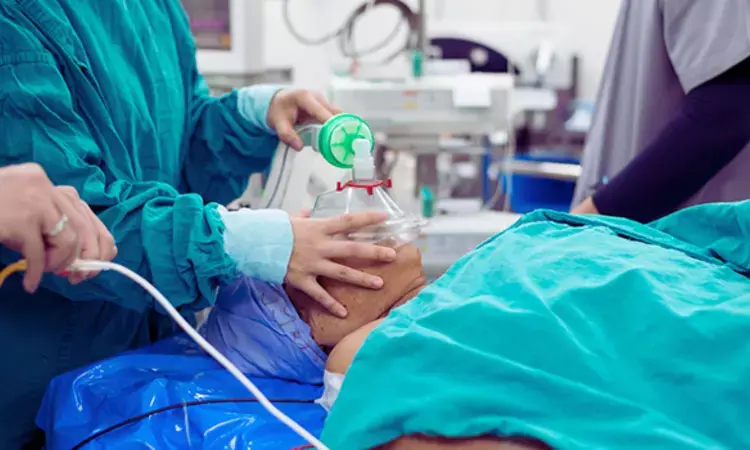- Home
- Medical news & Guidelines
- Anesthesiology
- Cardiology and CTVS
- Critical Care
- Dentistry
- Dermatology
- Diabetes and Endocrinology
- ENT
- Gastroenterology
- Medicine
- Nephrology
- Neurology
- Obstretics-Gynaecology
- Oncology
- Ophthalmology
- Orthopaedics
- Pediatrics-Neonatology
- Psychiatry
- Pulmonology
- Radiology
- Surgery
- Urology
- Laboratory Medicine
- Diet
- Nursing
- Paramedical
- Physiotherapy
- Health news
- Fact Check
- Bone Health Fact Check
- Brain Health Fact Check
- Cancer Related Fact Check
- Child Care Fact Check
- Dental and oral health fact check
- Diabetes and metabolic health fact check
- Diet and Nutrition Fact Check
- Eye and ENT Care Fact Check
- Fitness fact check
- Gut health fact check
- Heart health fact check
- Kidney health fact check
- Medical education fact check
- Men's health fact check
- Respiratory fact check
- Skin and hair care fact check
- Vaccine and Immunization fact check
- Women's health fact check
- AYUSH
- State News
- Andaman and Nicobar Islands
- Andhra Pradesh
- Arunachal Pradesh
- Assam
- Bihar
- Chandigarh
- Chattisgarh
- Dadra and Nagar Haveli
- Daman and Diu
- Delhi
- Goa
- Gujarat
- Haryana
- Himachal Pradesh
- Jammu & Kashmir
- Jharkhand
- Karnataka
- Kerala
- Ladakh
- Lakshadweep
- Madhya Pradesh
- Maharashtra
- Manipur
- Meghalaya
- Mizoram
- Nagaland
- Odisha
- Puducherry
- Punjab
- Rajasthan
- Sikkim
- Tamil Nadu
- Telangana
- Tripura
- Uttar Pradesh
- Uttrakhand
- West Bengal
- Medical Education
- Industry
Preoperative SGLT2 Inhibitor Use Not Linked to Higher DKA Risk, Claims Research

USA: Researchers have found in a new retrospective cohort study that SGLT2 inhibitor use before emergency surgery in patients with type 2 diabetes was not associated with an increased risk of postoperative diabetic ketoacidosis (DKA). This challenges existing FDA guidelines, which recommend withholding the medication for at least three days before surgery, a practice that can be burdensome for patients and healthcare systems.
"This finding indicates that the recommended 3-day preoperative withholding period for SGLT2i medications may not be necessary," the researchers wrote in JAMA Surgery.
The study states that case reports of postoperative diabetic ketoacidosis in patients using sodium-glucose cotransporter 2 inhibitors (SGLT2i) medications have led to the US Food and Drug Administration's recommendation to withhold these medications for at least three days before surgery. However, concerns about the potential negative consequences of preoperative medication withholding highlight the need for a large-scale evaluation of the risk of diabetic ketoacidosis in this population.
To address this, Anjali A. Dixit, Department of Anesthesiology, Perioperative and Pain Medicine, Stanford University School of Medicine, Stanford, California, and colleagues aimed to estimate the association between preoperative SGLT2i use and postoperative diabetic ketoacidosis in patients undergoing various emergency surgeries, where adherence to current withholding guidance is often not feasible.
For this purpose, the researchers conducted a retrospective cohort study among a nationwide sample of patients aged 18 years or older with type 2 diabetes, enrolled in commercial or Medicare fee-for-service insurance plans, who underwent one of 13 emergency surgeries between 2016 and 2022. Emergency surgeries were identified as performed on the same day or within one to two days after an emergency department claim.
The study analyzed data from November 2023 through December 2024 to assess the association between preoperative SGLT2i medication use and the risk of postoperative diabetic ketoacidosis, defined by diagnosis codes, within 14 days after surgery.
The study revealed the following findings:
- The study included 34,671 patients with type 2 diabetes who underwent emergency surgery, with a mean age of 63.9 years. Of these patients, 55.3% were female, and 44.7% were male.
- The most common surgeries were laparoscopic cholecystectomy (9,385 patients) and transurethral procedures (12,246 patients).
- 2,607 patients (7.5%) had used SGLT2i medications, while 32,064 patients (92.5%) had not.
- The unadjusted incidence of diabetic ketoacidosis was 4.9% in the SGLT2i-exposed group and 3.5% in the unexposed group.
- After adjusting for demographic characteristics, diabetes severity, comorbidities, and surgery type, the incidence of diabetic ketoacidosis was 3.8% in the SGLT2i-exposed group and 3.5% in the unexposed group.
- The average treatment effect (ATE) was 0.2%.
- Findings remained consistent across alternate analyses, including intensive care unit–level care as an outcome (ATE, −1.0%).
"The study found no increased risk of postoperative diabetic ketoacidosis in patients using SGLT2i medications before emergency surgery compared to non-users. These findings suggest that current preoperative withholding guidelines for SGLT2i medications may be reconsidered," the researchers concluded.
Reference:
Dixit AA, Bateman BT, Hawn MT, Odden MC, Sun EC. Preoperative SGLT2 Inhibitor Use and Postoperative Diabetic Ketoacidosis. JAMA Surg. Published online February 19, 2025. doi:10.1001/jamasurg.2024.7082
Dr Kamal Kant Kohli-MBBS, DTCD- a chest specialist with more than 30 years of practice and a flair for writing clinical articles, Dr Kamal Kant Kohli joined Medical Dialogues as a Chief Editor of Medical News. Besides writing articles, as an editor, he proofreads and verifies all the medical content published on Medical Dialogues including those coming from journals, studies,medical conferences,guidelines etc. Email: drkohli@medicaldialogues.in. Contact no. 011-43720751


